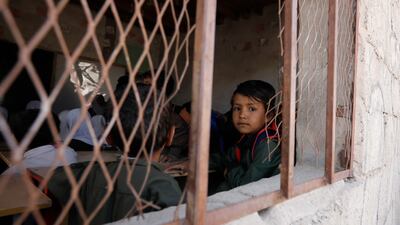The top UN advocate for children, Henrietta Fore, on Monday said 1.6 million young Yemenis have been forced to flee their homes due to fighting in hotspots such as Marib and Hodeidah and thousands of them are starving to death.
Ms Fore, executive director of Unicef, told the UN Security Council that one Yemeni child dies every 10 minutes from hunger and preventable maladies in the seventh year of fighting between rebel and pro-government forces.
Diplomats met in New York where they addressed an offensive by Houthi rebel fighters on hydrocarbon-rich Marib, the government’s last stronghold in northern Yemen, where fighting has pushed millions into hunger and poverty and tanked the economy.
“Being a child in Yemen means watching your parents struggle to provide enough food for your family to eat,” said Ms Fore.
“It means that if you are fortunate to have a school to go to, you could be killed by a bullet, explosion or stepping on a mine walking along the road simply to get to school.”
Seven years of fighting have turned Yemen into what the UN calls the world's worst humanitarian crisis, with 21 million people, including 11.3 million children, needing aid to survive, said Ms Fore. Some 400,000 children are so malnourished, they face an “imminent risk of death”.
About two million children have been denied an education and one in six schools has been bombed, raided or shuttered, she added. Many boys are told to take up arms and girls have to marry because their “family is out of options”.
“Being a child in Yemen means that you probably have either experienced or witnessed horrific violence to which no child should ever be exposed,” said Ms Fore.
“It means that if you do survive the war, you will carry the physical and emotional scars with you for the rest of your life.”
Yemen has been ravaged by war, disease and hunger since the Iran-backed Houthis seized the capital Sanaa and overthrew the government in 2014, drawing in a Saudi Arabia-led coalition the following year to restore the ousted leadership.
Fighting has forced millions of Yemenis to flee their homes, claimed hundreds of thousands of lives and ravaged the economy. Four fifths of Yemenis currently rely on aid.
A study by research group Acaps this month found that the Yemeni government’s suspension of fuel imports through the Houthi-held Red Sea port of Hodeidah in June 2020 had not led to shortages in rebel-held areas.
Instead, fuel traders within Yemen “quickly adjusted” and trucked supplies overland to Houthi areas, where fuel prices are higher, causing shortages in areas under the UN-backed government’s control.
“The Al Hodeidah suspension has increased already high fuel prices for consumers and aggravated shortages that affect the Yemeni people and their livelihoods,” researchers said in the eight-page study.
The Qatar Red Crescent Society on Monday unveiled a $600,000 plan to restore and equip six hospitals and clinics in the capital Sanaa and Taez with ventilators, drugs, imaging machines and other gear to help locals fight a wave of coronavirus infections.


